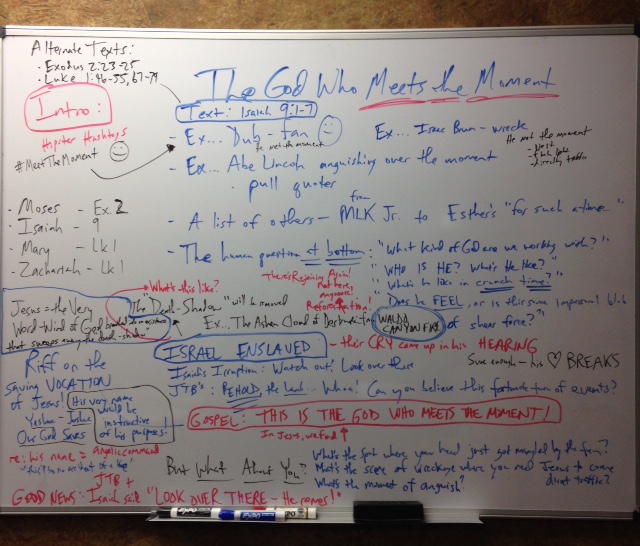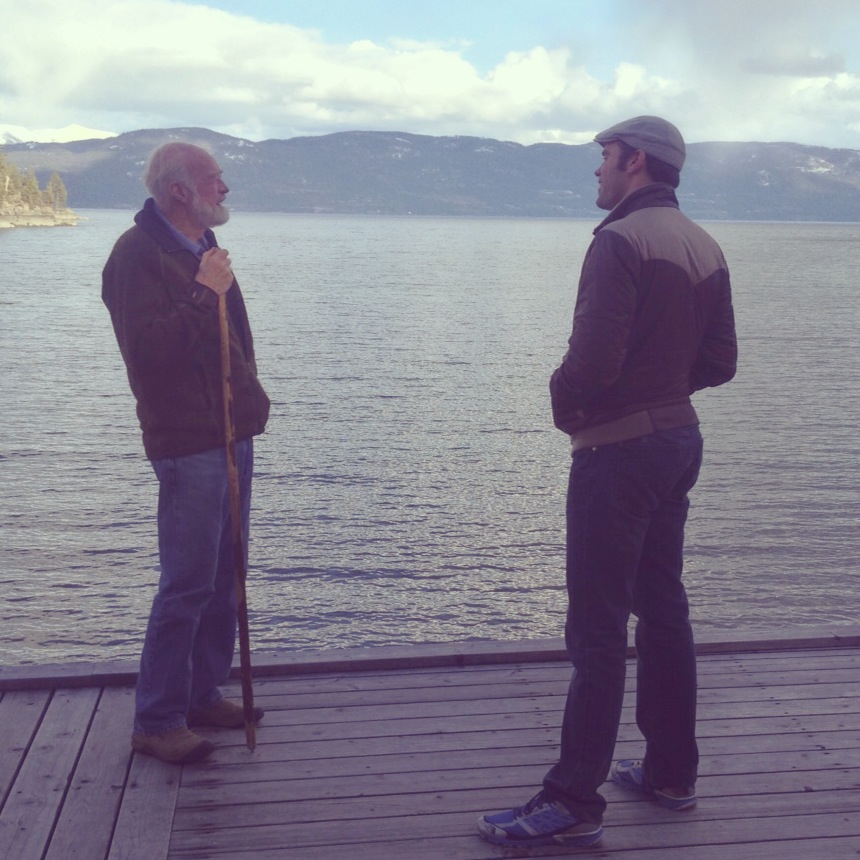She would always come up to me at church and give me a big kiss. Sometimes it was during worship, just before I would go up to preach. “I love you, honey. Go get em!” Other times, she’d come find me after the service and tell me how proud of me she was. Then she’d put a big one on me. Her name is Miss Q, a precious widow, now 77.
A few years ago, she told me that she had been diagnosed with dementia. I hugged her, tears flowing down our faces. And then we prayed. These last years, she’s come to church every week with her caregiver as I’ve watched dementia slowly take her over. But today it finally happened. She didn’t know who I was. At all. After 15 years of knowing each other. I sat and talked with her, but I could see her soul staring into the distant land, searching for that ancient memory of Home. I would have kissed her cheek, but for the first time today, I thought it might have disturbed her. Who is this stranger anyway?
As I walked away, it hit me: I love someone who can’t remember that she loves me.
I sat with that for a good while. And then it occurred to me that Valentine’s Day can be so hard for so many people for these very same reasons.
There are those of you who long to share this day with someone. You’ve lived well and done your part and trusted the Lord. But it just feels like a blank stare coming back at you. There are those of you who feel like you are the forgotten memory of someone’s former love. You have been betrayed and abandoned, moved on from. And others of you have been bereaved. The person with whom you shared love has entered eternal Love. Their heavenly gain is primarily experienced as your loss, especially on days like this.
And so, I thought I’d take the risk of naming it so that I can name the deeper truth at the rock bottom of it all. Which is that you are not forgotten. You are valuable. You are important. The world is better because you are in it. And you are loved, today and every day.
“It makes me angry…”
“It makes me angry.”
Slicing through our brooding bedroom darkness, those were the first words out of my mouth at 5 a.m today. Lisa was awake, I just knew it, though she had not spoken. After 15 years, I’m pretty sure I can just sense when she’s awake. So, she heard me, but she instinctually knew to leave some space for my venting. She slid her hand over and gently held mine while I went on.
“It makes me angry that…” I now got specific, and like a skilled southern preacher who starts riffing, that was my refrain. “It makes me angry that…” By this point, I had hopelessly broken into a kind of prayer that was pulsating with pathos and pain.
Some of you by now will be sure I have lost my mind. Some of you will have started feeling sorry for my wife and will start organizing meals and be thinking about how you might support her in days to come. “Who starts their day by naming their anger out loud? In the darkness? Sheesh!”
But this was actually a really good moment for me, and Lisa knew it. I have long suffered from an invisible-but-very-insidious condition that I might call “Christian Niceness,” a malady that makes you think you have to bury all the “bad” emotions. There is a biblical and theological house of cards that must be built to maintain this position, but we’ve figured out how to build it.
It goes something like this: The God who is good only deserves the “good” stuff, the thanksgiving prayers, the shouts of praise, the soaring doxologies that arise from soul-restoring Sabbaths and the slow Saturdays when we have not a care in the world. The myth of Christian Niceness is built on the faulty assumption that the God who once made the heavens and the earth is now somehow fragile (he must be getting older, right?), needing to be protected from all the contingencies and complexities of the human condition. This approach treats God as if he’s already done his hard work and is sliding into a slow retirement from the swirl of life.
But the psalmists of ancient Israel didn’t see God as fragile. They cracked open their hearts and poured out of their mouths the full spectrum of their emotions. Often pulsing with fury and exasperation, these words are enough to make the average believer blush.
“With my voice I cry out to the LORD…I pour out my complaint before him…”
Psalm 142:1-2
How long, O LORD? Will you forget me forever? How long will you hide your face from me? 2 How long must I take counsel in my soul and have sorrow in my heart all the day? How long shall my enemy be exalted over me? 3 Consider and answer me, O LORD my God.
Psalm 13:1-3a
The psalmists weren’t afraid. And neither was St. Paul who instructed the Ephesian believers to “be angry, yet do not sin.” Be angry!? Are you serious? Paul says if you’ve been wounded, you need to feel your way around the wound. If you’ve been hurt, don’t bury it. That sounds like an irresponsible thing for an apostle to command, but is it? Not at all, for Paul knows that if the anger is ignored and buried, it will bleed into everything else that you touch, everything else that matters.
So, I took the risk of voicing my anger early this morning. And Lisa joined me, praying peace into me as I released it. By the end of the time, I was finding space in my soul to release blessing and grace and forgiveness.
And do you know what happened? An hour later, our three kids stumbled downstairs into the kitchen for breakfast. We packed school lunches and double-checked homework assignments and searched high and low for socks and shoes. The morning rush out the door to school is often harried and frenetic, as any parent of young kids can tell you. But this morning we all laughed uproariously. We were playful and childlike and somehow un-rushed. I’m not exaggerating for effect. Things were different. And I think things were different because *I* was different.
Sisters and brothers, God is not old and fragile and scared. God is not afraid of your raw and unfiltered feelings. There are no “bad emotions” in the presence of God. The God of the ages is as young and scrappy as he’s ever been, and he’s ready to wrestle with you through your anger so that you can find your way into wholeness of soul. So take the risk. Tell him what you feel. Go for it.
The Meaning Beyond Absurdity

In 1975, Rabbi Abraham Joshua Heschel was asked how he would describe God. In great rabbinic simplicity, Heschel said, “God is the meaning beyond absurdity.”
The meaning. Beyond absurdity.
It doesn’t take much discernment to see that absurdity in life is a given. Think about the horrors of Auschwitz and the desecration of Dachau. Think about the heartbroken Syrian and Iraqi refugees living in the Beqaa Valley. Think about our impoverished Central American sisters and brothers who are aching for home. Think about all the abortions, and all the starving children with bloated bellies, and all the elderly bereft. The pain cuts deep.
Yes, life can be absurd, and Christians aren’t afraid to say it. In fact, every year saints all over the world block the better part of a week to name the darkness. Holy Week is the reminder that there will be stretches of life that are full of betrayal and denial, suffering and shame, death and the grave. But Holy Week is not some generic statement that life is hard and so we ought to just deal with it. Holy Week is the reminder that God-in-Christ cares, that he refuses to be distant and aloof, that he runs into the very worst of the absurdity himself.
Jesus had dull nails driven through his wrists. They jammed a crown of thorns into his brow and mockingly threw a purple robe on his back. “Some king you must be!” they taunted. Just hours before, Jesus was washing his disciples’ feet, but now his own feet have been struck a debilitating blow. He hung naked on the cross in front of the crowds as Judas walked down Golgotha with an empty soul and thirty pieces of silver. Absurdity, absurdity, Jesus knows absurdity.
But Rabbi Heschel was right. Life isn’t just absurd. As Heschel reminds us, “God is the meaning…” Which is to say, we are not nihilists. The world is not fatalistically flawed and godlessly spinning its way to destruction. As Gerard Manley Hopkins put it, “the world is charged with the grandeur of God.” We see it every day as the sun rises and light “flames out, like shining from shook foil.” Every morning is an eruption of mercy and meaning. Birds are chirping their choruses and carols. Little children are still singing and dancing and asking for nighttime stories to be read to them. Hatred is still bowing low in the presence of love. Friendship is still the true sign of how wealthy a person is. There is meaning because we live in a world enchanted by God’s Holy Spirit.
But there can only be meaning because Jesus was plunged into the abyss of absurdity. He took the full spectrum of human rebellion and the pain and absurdity of the world into his body—into the very depths of his being—and was crushed by it. And on this Holy Saturday we are not in a hurry to race ahead to Sunday. We sit patiently and feel something of that crushing.
But Christians will get up tomorrow morning with a shout because on the third day, his Father raised him to life so that he stands beyond the absurdity and finality of death. And this is precisely why Jesus is still being talked about all these years later. This is precisely why billions of people the world over have worshipped and given their lives to him. Because his resurrection has once-and-for-all secured the meaning beyond absurdity.
Scribbling the future into existence: some thoughts for writers, speakers, and creators

I’ll start with a silly confession: for years, I’ve been jealous of journal-ers.
Some time ago I discovered that there exist people who are able to sit with their thoughts in a place of quiet reflection, and on their first attempt at synthesizing the maelstrom of joys and hopes and fears that swirls at the core of human existence, they’re able to write out these most gorgeous entries.
How do they do it? I wonder.
While I’m being a bit dramatic for affect, the reality is that for some time I’ve felt like my creative process is inadequate. I’ve had this Goliath-like figure that stands up in my soul and taunts me, threatening to turn me into one of David’s sidelined older brothers.
The Philistine Ogre shows up unannounced, in unpredictable intervals, and struts out to say something like,
- …If you could just be more creative…
- …If you could only acquire the secret mojo…
- …If only you were more like so and so who is so talented…
- …Then you’d be able to make some sort of significant contribution…
- …And what’s wrong with you anyway? It comes so easily to everybody else.
Here’s how my process has worked. For years and years, I’ve jotted down incomplete notes on scraps of paper, Chick-fil-A napkins, and on legal pads that double as my to-do list for house projects. Fragments of sermons that ended up on the cutting room floor; sections of blogs I tried to write but never completed; an attempt at writing a short poem; scores of Word documents that’ll never see the light of day; a white board covered with the constellation of thoughts I’ve been having about the text I’ll preach this week. (See the picture above, which is my attempt at working out the sermon I’ll preach this weekend.)
The notes are strewn about my desk, some tucked away in green folders in my filing cabinet tabbed with imprecise titles. Many of these notes can be found in the middle console of my car or in the side pocket of my gym bag.
What a dumb process, right? How disorganized, ya? I thought so, at least until recently.
I stumbled onto a book called A. Lincoln, which is a 700-page biography of the 16th President of the United States. It’s gorgeous and reads like a novel. In it I discovered that Lincoln’s creative process was so imprecise, so choppy, so seemingly random. At first blush, one might think he was easily distracted and unable to see a project through. Lincoln would scribble out thoughts in the margin of the morning newspaper and tuck it into his top hat to develop later. He had scraps of paper in every pocket and every drawer of his desk—a pithy aphorism that would work well rhetorically, a reflection on a certain general’s strategy for the eastern front of the war, some of his own commentary on an op-ed in the Washington Star. These notes were incomplete, but as you find out later in the book, they served as the first drafts of what would become his most brilliant, nation-shaping, slave-freeing speeches.
These fragmentary notes were not about precision. They were about practice. Abraham Lincoln spent years practicing his way into a future that would require the very best of his literary and oratorical skills, and he did it by filling up one scrap of paper at a time. We shouldn’t be surprised, then, that as the nineteenth century unfolded, President Lincoln was somehow always able to rise to the occasion with a “word fitly spoken” that became like “apples of gold in settings of silver” (Proverbs 25:11). This was no accident. He was able to go to the bank and make withdrawals when he needed because he had made so many deposits along the way.
_________________________
If you’re anything like me, you’ve been quick to assume that your creative process stinks, and you’ve believed the lie that it comes so naturally to everyone else but you. Don’t believe it. It’s hard for all of us. It takes work. I wish I had better news for you, folks, but the only way to punch through the wall is to punch through the wall.
So keep jotting, keep experimenting, keep practicing. See where the idea—and, even better, the Spirit of the endlessly creative God—takes you. Because my suspicion is you might just be preparing for a future you could never imagine, for a moment in time when someone will need to hear a “word fitly spoken” by you.


